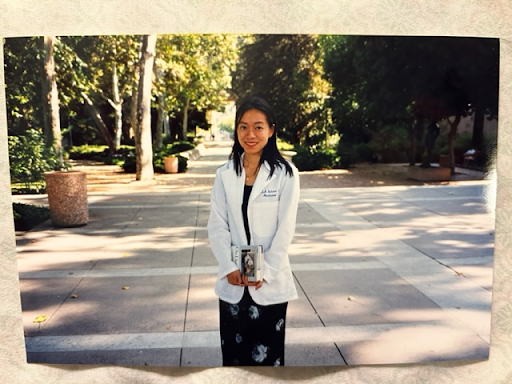
I still recall that fateful day as a teen when I knew I wanted to pursue a career in medicine. My eyes brimmed with tears after seeing William Hurt’s character in “The Doctor” transform into an empathetic and caring physician. I was captivated by how medicine enabled one to form deep personal connections and to help in times of great need.
During high school in suburban Northern California, I volunteered at a local county hospital transporting patients, delivering specimens, and stocking snacks at the gift shop. Here I had my first encounters with patients and families who lacked basic resources, like food and housing, and who experienced barriers to care.
The inequalities and disparities that existed within our society weighed heavily on me. At the same time, I was moved by how physicians could make an impact through not only providing medical care, but also resources, education, and support.
The Premed Journey Begins
Years later, I started college with my mind set on going to medical school and finding ways to address these disparities. The first two years of college were grueling as I stumbled my way through core premed courses. Chemistry had never been my strong suit, and this became crystal clear during my organic chemistry class when I struggled to grasp concepts in three dimensions.
I often found myself bogged down in the weeds of understanding a particular chemical reaction or computation, losing focus of the big picture of why I was even learning these things.
I later took a public health course on healthy communities, in which each student participated in a project in Oakland. For my project, I worked with several nonprofit organizations that were starting a free computer center and after-school program for low-income individuals.
Apply To Medical School or Take a Gap Year? That Is the Question.
As college graduation neared, I had to decide whether to apply to medical school to begin shortly after finishing college (a traditional timeline) or take a couple years off and work as the coordinator of the computer center and after-school program. This opportunity, although not directly related to medicine, was very much aligned with my core values of helping others. Up until this point, my life had followed a well-defined, almost predetermined path, from one school to the next.
Taking gap years between undergrad and medical school was not as common practice as it is now. To my 21-year-old self then, two years seemed like an eternity to be on a break. Would I lose my focus? How would family and friends react?
Eventually, I realized I wasn’t ready to go straight into med school just yet.
On a practical level, I wanted more time to prep for the MCAT and write my medical school applications.
On a deeper level, I was struck by the realization that, being in school most of my life, I didn’t really understand the real world beyond the academic gates.
On an existential level, I felt somewhat disillusioned and had difficulty truly connecting what I was learning in class with how I would someday make a difference.
Bridging the Gap During My Gap Year
Looking back, I still view my gap years as one of the best and most impactful times of my life. I had the privilege to introduce technology to individuals who had never used computers before, help people write resumes and look for jobs, and provide neighborhood kids with a safe place to study and hang out.
I developed a deeper understanding of how one’s health is influenced by medical conditions and a broad range of external factors, including access to resources and safety. I learned how to talk to people from different backgrounds and appreciate how there were often more similarities than differences with those I got to know.
I also began learning how to be an educator and meeting each learner where they were at to introduce concepts in understandable ways. These early lessons in teaching were instrumental to my work as a physician, where I helped patients understand medical conditions and treatments. Although I didn’t know it at the time, they also set a foundation for my current work as a medical educator with Blueprint/Rosh Review.
My gap years also gave me time to study for the MCAT and work on med school applications. It gave me invaluable time to spend with family and friends, travel, and even develop hobbies and life skills—like learning how to cook!
The Best Option Isn’t Always the Traditional One
I have had other moments when I veered off the beaten path throughout my career, such as when I transitioned to working mostly in medical education. During each of these instances, I’ve experienced the same familiar mix of emotions: uncertainty, fear, twinges of guilt, and prevailing hope.
When making career-changing decisions, I have come back time and again to two key insights: first, to use my long-term core values as my guidepost, and second, to realize that the best option may not be the most traditional or direct one—and this is ok!
A wise colleague once surprised me by sharing that he, a distinguished university professor, still wondered sometimes what he would be when he grew up. When I first decided to go into medicine years ago, I had no idea how broad the field was or how many different types of opportunities existed.
While I still don’t have all the answers, I really enjoy my work in medical education and the opportunities to help others and bridge disparities. I hope to continue making decisions guided by the compass of my values and chart my own path.
As Rilke once said, “Be patient toward all that is unsolved in your heart and try to love the questions themselves… Do not now seek the answers, which cannot be given you because you would not be able to live them. And the point is, to live everything. Live the questions now. Perhaps you will then gradually, without noticing it, live along some distant day into the answer.”
Melinda Chen, MD is a general internal medicine physician, medical educator, and health services researcher on the Internal Medicine team at Blueprint/Rosh Review.
Everyone’s journey to becoming a doctor looks different, but they all start with the MCAT and applying to medical school. Blueprint MCAT can help you at every stage of your journey with free MCAT resources, MCAT courses, and medical school admissions consulting.
Search the Blog

Free Consultation
Interested in our Online MCAT Course, One-on-One MCAT Tutoring or Med admissions packages? Set up a free consultation with one of our experienced Senior Student Advisors.
Schedule NowPopular Posts
-
MCAT Blog What's on the MCAT?
-
MCAT Blog How to Review MCAT Full Lengths

Free MCAT Practice Account
Need great MCAT practice?Get the most representative MCAT practice possible when you sign up for our free MCAT Account, which includes a half-length diagnostic exam and one of our full-length MCAT practice exams.
Learn More







